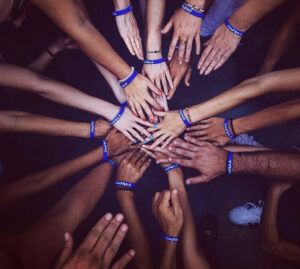
I find Brené Brown’s work illuminating. I always learn from her. In her book and streamed series, Atlas of the Heart she describes the path of what skills we need for cultivating connection. She also draws on the Bhuddist terms “Near” and “Far” enemies which are invaluable for understanding what gets in the way of true connection.
In our fractured world and fractured society, we need to focus on cultivating connection within our families, our friends, our communities, our countries, and world-wide.
Brené Brown’s definition of “CONNECTION is the energy that exists between people when they feel seen, heard, and valued; when they can give and receive without judgment, and when they derive sustenance and strength from the relationship.”
AWARENESS = ACTION
By understanding “Far Enemy” and “Near Enemy” states of being, we can become more aware of what sabotages connection and what cultivates connection.
What is a “Far Enemy” state?
A Far Enemy state is the opposite of what we are trying to achieve.
For example, Brené says we may wish to cultivate connection but if we are vested in protecting our own fragile sense of self-worth we may:
- Shut down or give up
- Armour up
- Show indifference, disinterest or defensiveness
- Hustle and show excessive pride
- Get stuck in fear and shame
- Disconnect from ourselves
Instead of walking alongside which cultivates connection, the far enemy action would be to walk away.
For example, she says by defaulting to self-protection and being self-focussed, we might:
- Disconnect/Disengage
- Treat others as if they are invisible
- Create distance
- Judge
- Leverage power OVER
- Be enmeshed or build walls
- Dismiss
- Diminish the humanity of others and ourselves
Far Enemy states are easier to recognize than Near Enemy states.
What is a “Near Enemy” state?
Near Enemy states fit under the category which Brené refers to as “All knowing and proving”.
This may look like:
- Not owning our own hurt, pain and fear and saying “Everything is fine.”
- Performing vulnerability
- Avoiding vulnerability
- Challenging and criticizing versus being curious and contributing
- Thinking our emotions but not actually feeling them
- Self-protecting with perfectionism (another way of not being vulnerable)
Brené points out that Near enemy states can also be forms of subtle control.
For example:
- Performing concern while trying to control or distance
- Showing pity
- Comparing suffering
- Defaulting to sympathy and as Brené Brown calls them, and other “empathy misses”
- Performing non-judgment but actually judging, comparing, blaming and distancing
- “Helping” by trying to control people and outcomes
- Connecting for personal gain, fitting in or control
- Becoming enmeshed or too distant
- Unsolicited advice-giving and problem solving
- Narrative takeover or Narrative tap-out (not hearing and validating the other person)
“Encouragement misses” also seem to be a Near Enemy.
For example:
- Over-praising: “You’re a genius!” “You’re just soooo amazing!”
- Complimenting too much for tasks that are expected and age-appropriate
- Laughing at everything someone says as a way to connect, but instead it leaves the other person feeling uncomfortable
- Patronizing – the person thinks they’re being kind but they are acting superior and the receiving person feels less-than
Cultivating Connection…How Do We Do This?
Brené Brown explains that we need to work on developing grounded confidence which comes from learning and always aiming to be improving ourselves.
We do this by:
- Practicing courage
- Giving vulnerability a go (she calls it “rumbling with vulnerability”)
- Staying curious
- Practicing humility
- Committing to mastery and practice
- Feeling connected to self (Begin with five minutes of quiet focussed breathing each day)
She says we can also commit to having the courage to walking alongside others by:
- Committed to being other-focussed
- Practicing compassion
- Practicing empathy
- Practicing non-judgement
- Sharing “power with” (being supportive) and “power to” (empowering)
- Being relational
- Setting and respecting boundaries
- Building narrative trust – believing, acknowledging and affirming
With all the suffering happening on our planet, understanding the states of Near and Far Enemies and the skills we need to build meaningful and authentic connection is essential.
As Archbishop Desmond Tutu said:
“We are made for goodness. We are made for love. We are made for friendliness.We are made for togetherness. We are made for all the beautiful things that you and I know. We are made to tell the world that there are no outsiders. All are welcome: black, white, red, yellow, rich, poor, educated, not educated, male, female, gay, straight, all, all all. We all belong to this family, this human family, God’s family.”
Warmly,

PS. Registration is now open for my next round of Self-Empowerment Groups for children ages 7-9 yrs. and 10-12 yrs. These groups help your child have the tools to: value their self-worth, understand social dynamics and what to do in a variety of challenging situations, how to self-regulate their big feelings, how to set boundaries and understand why boundaries are so important, and learn about mindset, optimism and pessimism. Here you can find more information and register.
Want to Connect?
Subscribe now to receive free weekly parenting tips and inspiration.






